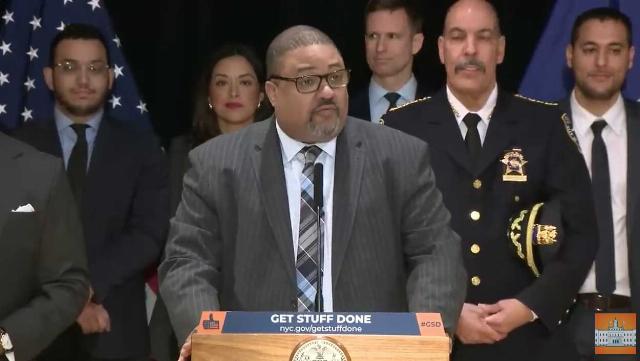The missing element in Bragg's case
There is something vital and profoundly disturbing missing from Alvin Bragg’s prosecution of Donald Trump: police involvement. It’s possible some police officers were assigned to the prosecutor’s office, but if so, their names do not appear in the indictment (available here), nor, according to The Hill, there were no police officers among the 20 prosecution and two defense witnesses. I’ve been unable to find any evidence of police participation.

Graphic: YouTube Screenshot
So, no cops were apparently involved. So what?
The police are an essential initiator of criminal charges. They’re also a multi-layered filter for false and/or political charges against the innocent. Among their many duties, police supervisors are charged with ensuring every charge made by an officer is legitimate, untainted by laziness, personal animus or political dirty tricks. Supervisors at the rank of Lt. and Captain serve as further filters, reviewing all paperwork submitted to prosecutors to ensure police integrity. Tainted, bad cases blow back on every police officer, making an already difficult job harder and more dangerous, and professional agencies take preserving their integrity seriously.
The criminal justice process is supposed to begin with the police, with a predicate—a reason—to investigate any crime. The predicate may be a citizen report of a crime, which followed up by detectives yields a suspect. It may be information from informants, but in that case, the police are careful to confirm that information; they don’t just take any informant’s word. Or a police officer may simply witness someone committing a crime.
It's essential this process is followed. Without it, officers may decide, without a predicate, someone needs to go to jail. Supervisors at every level may fail in filtering. Failing to involve the police also wastes their training, knowledge and experience.
Normally, a crime is initially investigated by a patrol officer, then forwarded to a detective. If the detective finds a suspect and enough evidence to constitute probable cause, they send an affidavit to the prosecutor, listing their name, position and experience and describing, in detail, why they believe a specific crime has been committed and why they believe a specific person committed it. Notice, the legitimate process always begins with a crime.
It's then up to the prosecutor to determine whether there is enough evidence to prove the case beyond a reasonable doubt at trial. Prosecutors do not conduct investigations. They aren’t trained to do that, they’re not competent nor do they remotely have the time, particularly in a major city. If additional evidence is needed, they ask the detective involved to find it.
If a criminal case goes to trial with no police involvement, something has gone wrong.
In the Trump case, Alvin Bragg ran for office on the promise to “get” Donald Trump. His predecessor, Cyrus Vance, refused to prosecute the case, as did every level of the Federal Government, refusing even a civil effort. Bragg initially refused the case, but decided to pursue it when a former assistant prosecutor wrote a book about it.
The indictment reads:
THE GRAND JURY OF THE COUNTY OF NEW YORK, by this indictment, accuses the defendant of the crime of FALSIFYING BUSINESS RECORDS IN THE FIRST DEGREE, in violation of Penal Law §175.10, committed as follows:
The defendant, in the County of New York and elsewhere, on or about February 14, 2017, with intent to defraud and intent to commit another crime and aid and conceal the commission thereof, made and caused a false entry in the business records of an enterprise, to wit, an invoice from Michael Cohen dated February 14, 2017, marked as a record of the Donald J. Trump Revocable Trust, and kept and maintained by the Trump Organization.
The remaining counts simply add check or voucher numbers. No “another crime” is identified, nor is any police officer/investigator mentioned. It’s possible an officer testified before the grand jury, but if so, they would have been essential to establish a foundation for at least some evidence at trial, and no officer testified there.
Grand juries do not investigate crimes. They hear only the “evidence” presented by prosecutors, which is the origin of the old saw: “a prosecutor can get a grand jury to indict a ham sandwich.”
The third ranking lawyer at the federal DOJ helped Bragg prosecute the case—an enormous voluntary demotion--and innumerable assistant prosecutors were involved. It appears no investigation was necessary. They had their man, and they invented three uncharged and unproven crimes, part and parcel of an unprecedented, “novel legal theory.”
Even though they were apparently not involved, the police will suffer for this perversion of the criminal justice system. We all will.
Mike McDaniel is a USAF veteran, classically trained musician, Japanese and European fencer, life-long athlete, firearm instructor, retired police officer and high school and college English teacher. He is a published author and blogger. His home blog is Stately McDaniel Manor.





